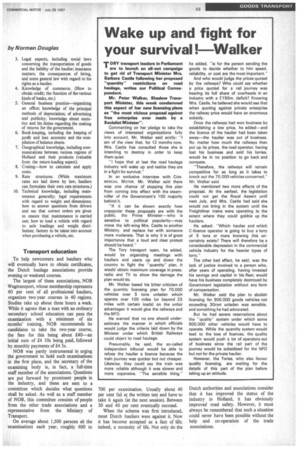Wake up and fight for your survival! Walker
Page 57

If you've noticed an error in this article please click here to report it so we can fix it.
TDRY transport leaders in Parliament
are to launch an all-out campaign to get rid of Transport Minister Mrs. Barbara Castle following her proposed "quantity" restrictions on road haulage, writes our Political Correspondent.
Mr. Peter Walker, Shadow Transport Minister, this week condemned this aspect of her new licensing plans as "the most vicious proposal against free enterprise ever made by a Socialist Minister".
Commenting on her pledge to take the views of interested organizations fully into account, Mr. Walker said acidly: "I am of the view that, for 12 months now, Mrs. Castle has consulted those she is intending to destroy in order to keep them quiet.
"I hope that at last the road haulage industry will wake up and realize they are in a fight for survival."
In an exclusive interview with COMMERCIAL MOTOR, Mr. Walker said there was one chance of stopping this plan from coming into effect with the steamroller of the Government's 100 majority behind it.
"If it can be shown exactly how unpopular these proposals are with the public, the Prime Minister—who is sensitive to political popularity—may move the left-wing Mrs. Castle to another Ministry, and replace her with someone more moderate. That is why it is of great importance that a loud and clear protest should be heard."
The Tory transport team, he added, would be organizing meetings with hauliers and users up and down the country to fight the "quantity" plan. It would obtain maximum coverage in press, radio and TV to show the damage the plan would do.
Mr. Walker based his bitter criticism of the quantity licensing plan for 70,000 vehicles over 5 tons unladen which operate over 100 miles for beyond 25 miles with certain loads) on the unfair advantages it would give the railways and the NFO.
He warned that no one should underestimate the manner in which officials would judge the criteria laid down by the Minister under which British Railways could object to road haulage.
Presumably, he said, the so-called independent tribunal would be able to refuse the haulier a licence because the train journey was quicker but not cheaper. Likewise, they could say the train was more reliable although it was slower and more expensive. "The sensible thing," he added, "is for the person sending the goods to decide whether to him speed, reliability, or cost are the most important."
And who would judge the prices quoted by the railways? Who could say whether a price quoted for a rail journey was bearing its full share of overheads in an industry with a E150m. deficit? Knowing Mrs. Castle, he believed she would see that when quoting against private enterprise the railway price would have an enormous subsidy.
Once the railways had won business by establishing a low price, he added—and the licence of the haulier had been taken away—the haulier was out of business. No matter how much the railways then put up its prices, the road operator, having lost his business and sold his lorries. would be in no position to go back and compete.
"Therefore, the railways will remain competitive for as long as it takes to knock out the 70.000 vehicles concerned," Mr. Walker said.
He mentioned two more effects of the proposal. At the earliest, the legislation could not get the Royal Assent until next July, and Mrs. Castle had said she would not bring in the system until the Freightliner trains were operating to the extent where they could gobble up the hauliers.
He asked: "Which haulier and which C-licence operator is going to buy a lorry of 5 tons or more knowing this uncertainty exists? There will therefore be a considerable depression in the commercial vehicle industry for the heavier types of lorry."
The other bad effect, he said, was the lack of justice involved to a person who, after years of operating, having invested his savings and capital in his fleet, would have his business completely destroyed by Government legislation without any form of compensation.
Mr. Walker said the plan to abolish licensing for 900.000 goods vehicles not exceeding 30cwt unladen was sensible, and something he had advocated.
But he had severe reservations about the "quality" system under which some 600,000 other vehicles would have to operate. While the quantity system would lead to the loss of licences, the quality system would push a lot of operators out of business since the rail part of the journey would be subsidised for the NFO but not for the private haulier.
However, the Tories, who also favour quality licensing, are waiting for the details of this part of the plan before taking up an attitude.




































































































































































